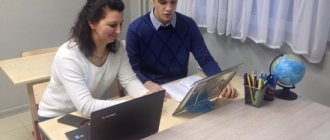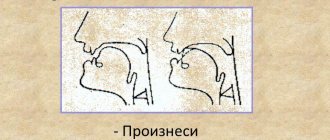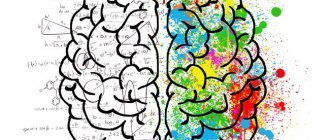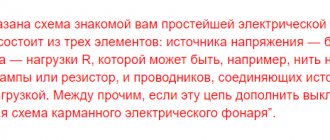SIGNS OF SPEECH DEFECTS
There are certain signs that indicate the possible development of speech defects.
Expressive speech disorder – poor vocabulary, underdeveloped speech, poor perception and memorization of new words, misunderstanding of tense forms of verbs, reticence, use of the same phrases in conversation. In this case, the pronunciation of words can be correct.
Receptive language disorder – lack of interest in conversations. At the same time, the baby has difficulty following directions, often does not understand well what is being said to him, and cannot write or read what is written.
SPEECH DEFECTS IN ADULTS
In adults, speech problems arise for two reasons:
- physiological (past illness, injury or concussion);
- psychological (fear, extreme anxiety or stress).
If the reasons are physiological, then you need to seek medical help (you will need surgery or the services of an otolaryngologist).
If you have psychological problems, you need to consult a psychiatrist or psychotherapist. However, do not forget about consulting a speech therapist or speech pathologist.
WHOM TO CONTACT?
Correction of speech defects is carried out by two specialists - a defectologist and a speech therapist.
A speech therapist is a specialist who restores the speech of patients who do not have any deviations in physical and mental health, as well as disorders of the central nervous system.
A defectologist is a doctor who not only teaches how to speak and pronounce sounds correctly, but also deals with the correction of developmental disorders. The task of this specialist includes several tasks - eliminating defects of the speech apparatus, teaching a person to communicate, overcoming barriers and life difficulties.
Speech disorders in childhood - causes and treatment
The most commonly diagnosed speech defects in children are lisp and burr. These are so-called natural disorders that are observed in almost all children who begin to speak.
The appearance and consolidation of such violations depends on many factors. In particular:
- parents copying the incorrect sound pronunciation of their child;
- the presence of such disorders in the child’s immediate environment - the baby involuntarily copies such speech;
- severe psychological stress.
As we already wrote above, speech therapists and defectologists scientifically call these speech defects dyslalia. The pathology is characterized by a disturbance in the reproduction of hissing and whistling sounds. It is considered normal if a child does not pronounce certain sounds until he is three or four years old. Correction of speech defects must begin and the child must be sent to speech therapy classes if the problem does not disappear on its own by the age of 5.
How to get rid of pronunciation defects? First of all, the baby’s parents need to consult with a speech therapist and show the child to a specialist as early as possible. He will be able to determine the type of speech disorder that is occurring and select an individual training program. Properly selected speech therapy sessions will very quickly help correct speech deviation.
For example, the source of speech disorders can be the abnormal development of the articulatory apparatus - an incorrectly formed bite, “cleft lip”, short frenulum of the tongue, “cleft palate”, pathologies of the jaw structure and others. Some types of speech defects are formed as a result of pathologies of the central nervous system, the structure of the nose or vocal cords.
It is important to remember that lisp and burr are the physiological norm in children 3 to 5 years of age. The reason is an incompletely formed articulatory apparatus and bite. In addition, the child is still learning to breathe correctly.
How to correct speech defects? To improve the pronunciation of hissing or other problematic sounds, you can use tongue twisters and always with a letter that causes difficulty in pronunciation for the child. But this should be done only after the articulation has been correctly set, otherwise the child will simply reinforce the incorrect position of the speech organs.
- We have silver chicks in the stove.
- Cuckoo bought a hood.
WHAT CAN THE “DOCTOR ZUKOV” CLINIC OFFER IN KURSK?
The Doctor of Sounds clinic in Kursk works in a variety of areas. This includes speech therapy, defectology, speech therapy massage, and early speech development.
Treatment is carried out by qualified specialists with extensive experience. They can find an individual approach to each patient.
Speech therapists from the clinic will not only teach you to speak correctly and clearly, but will also help eliminate speech defects such as allalia, rhinolalia, and dysarthria. If necessary, the person will be assigned special classes (for dysphagia and dyslexia, when there are impairments in mastering reading and writing skills).
Goals of defectology:
- studying children with special needs;
- selection of individual correction techniques;
- training and education of people with psychophysical disabilities.
The speech pathologists at the Doctor of Sounds clinic have the most modern methods and techniques that make it possible to identify speech disorders in early childhood, thereby increasing the chances of special children to improve their quality of life.
Teachers pay attention not only to pronunciation, but also to intonation, grammatical and phonetic components. Classes will expand your vocabulary and develop the ability to speak correctly and coherently. To improve the perception of information, specialists use exciting gaming techniques.
The center employs highly qualified speech therapists-defectologists and oligophrenopedagogues. They conduct classes for children with the following pathologies: developmental delay, visual impairment, hearing impairment, speech impairment, musculoskeletal impairment, mental retardation, and other abnormalities.
Classification
The types of speech defects are quite numerous. The most common are burr and lisp (types of dyslalia).
What are the types of speech defects? It is customary to highlight:
- Dislalia. A similar deviation occurs in people with good hearing and a developed articulatory apparatus. This is a defect expressed in incorrect pronunciation of sounds, replacement by others or complete absence. The violation can be corrected with the help of special speech therapy exercises and regular pronunciation of various types of tongue twisters to consolidate correct articulation.
- Dysarthria. The reason is the lack of a complete relationship between the parts of the nervous system and the organs of articulation. The patient has impaired mobility of the velum, lips and tongue. Speech defects in children in the form of dysarthria are expressed in difficulties with writing words, reading texts and general speech underdevelopment. In adults, the ability to perceive oral speech, read and write words will be fully preserved.
- Rhinolalia. The pathology is expressed in nasality, i.e. the man talks as if he has a bad runny nose. The cause is a dysfunction of the nasopharynx.
- Stuttering. The condition is accompanied by repeated reproduction of syllables, complete words, their lengthening, etc. The development of such a speech defect is caused by excessive tension in the muscular system of the speech apparatus. Children develop stuttering between the ages of two and five, when the child is actively learning to speak. Moreover, the pathology is detected several times more often in boys than in girls. Potential causes may include: severe fright, exposure to a blast wave (typical for adults), too rapid development of vocabulary, a stuttering parent (in this case, imitation occurs), cerebral palsy and some others.
- Aphasia. Loss of verbal speech after its formation in the speech center with a properly functioning speech apparatus.
- Alalia. The development of pathology is most often caused by birth injuries. The child experiences damage to parts of the brain responsible for speech development. At the same time, hearing and mental development are not affected.
BASIC PRINCIPLES OF OPERATION OF THE CENTER IN KURSK
The center practices an individual approach to each patient, personal selection of diagnostic and correction methods. The specialists treat everyone who comes to the clinic with care and very patience, and always provide feedback to the parents of young patients. Parents are also consulted and useful recommendations are selected. After each lesson, a positive result is noticeable.
The network employs real professionals in their field. They have knowledge, skills and experience, therefore, they can provide quality assistance in each specific case.
It is important to understand that effective elimination of speech disorders is very important for every person. After all, it is speech that allows you to find your place in society and achieve certain heights. Every person should have this opportunity. Don’t delay your visit, call, make an appointment for your child and give him a future.
How not to rush and not chatter?
We will help you normalize your speech rate!
Many people don’t know... that the pace of speech is breathing! The way you breathe is the way you speak...
This is the art of pausing!
People who speak very fast
:
— do not leave pauses to support proper breathing
- and another reason: the tongue is inactive
It is difficult for such a tongue to switch from one position to another (the sounds have different positions - some are behind the lower teeth, others are behind the upper teeth, and there are also back ones!
However, if the tongue is sluggish, it will be difficult to speak!
Speech therapy help is needed here!
The pace of speech also directly depends on the placement of pauses!
A fast pace of speech is good, provided that all words are pronounced clearly and that the pauses are sufficient for the listener to think about what has been said!
Pause to breathe in air
, give your brain the opportunity to prepare what will be said, and the listener to realize what has already been said. Pauses give rest to both the brain and body!
Some of us do not dare to pause and fill the gaps with filler words, all sorts of things: “uh-uh,” “mm-mm,” “you see,” “well,” “here,” etc.
When using junk words, speech takes on a tone of indecision
, and the speaker looks uncertain.
The ability to pause is a sign of great confidence! People see that you pause to think, and this gives you extra authority!
If your interlocutors see that you feel comfortable, they will also feel comfortable talking with you.
Diagnostics
The appearance of speech hesitations is a reason to immediately seek the advice of a speech therapist. The sooner their cause and nature are established, the more effective the therapeutic and corrective effect will be. Diagnostics consists of three blocks:
- Speech therapy examination.
Includes the study of oral speech, its tempo-rhythmic and intonation-melodic organization. The type of hesitation and the conditions for its occurrence are determined. The characteristics of voice and breathing are assessed. The task of speech therapy diagnostics is to differentiate non-convulsive hesitations from stuttering. - Neurological examination.
A consultation with a neurologist involves studying the medical history, identifying neuropsychic disorders and factors that caused the patient to hesitate in his speech. In order to exclude brain pathology, instrumental techniques are prescribed: EEG, EchoEG, cerebral MRI. - Psychological examination.
An analysis of the HMF is carried out: attention, memory, thinking. At this stage of diagnosis, attention is paid to the state of general and manual motor skills, various types of praxis, and gnosis. The patient’s personal characteristics, his reaction to his defect, and the presence of fear of speech are analyzed.
Types of speech disorders
Modern medicine knows two main types of speech disorders after a stroke: aphasia and dysarthria. In the first case, speech is impaired due to the death of neurons and their connections in the brain center that is responsible for speech. Aphasia can be complete or partial. Dysarthria occurs against the background of the fact that the centers in the brain responsible for the functioning of speech muscles have been damaged.
Aphasia
It is the most common cause of speech impairment. There are six variations of aphasia in total:
- Motor
. This form is divided into two more types of aphasia. With afferent aphasia, the patient cannot choose the articulatory posture that is needed in order to pronounce specific sounds. With efferent aphasia, speech is preserved at an instinctive level, but repetition is impaired. Victims have difficulty moving from one position to another. - Dynamic
. In this variant, patients experience problems with active utterance: the inability to correctly formulate a sentence because both external and internal speech are impaired. There are frequent cases of echopraxia - repetition - situations when the patient automatically begins to repeat words, phrases, facial expressions or gestures after the interlocutor. - Sensory
. It is divided into three types: cortical, subcortical and transcortical aphasia. In the first case, the patient lacks both understanding and pronunciation of sounds; in the second, the transmission of impulses from the parts of the brain responsible for the perception of sound information is distorted. In the third case, writing and visual function are impaired, but the patient is capable of perceiving light speech structures. - Sematic
. The victims do not fully understand the complex speech structures that are responsible for spatial relationships. Problems are often observed when completing tasks that contain complex syntactic formulations. Patients forget the names of the simplest household items - dishes, furniture, clothing, electrical appliances, and read slowly. Sometimes acalculia develops, a neuropsychological disease when a person loses the ability to count consistently. - Acoustic-mnestic
. With this aphasia, patients experience difficulties that are associated with the ability to retain information perceived auditorily in memory. During classes with a speech therapist, patients cannot repeat the simplest connections of several words, or understand the meaning of a sentence when it is pronounced at a fast pace or during a conversation with several interlocutors. - Total
. A distinctive feature of this type of aphasia is the complete absence of speech due to damage to a large number of areas of the brain. Total aphasia is subject to hard and long-term correction work from various specialists - from massage therapists to speech therapists.
Dysarthria
A type of speech disorder when a stroke victim has impaired functioning of the organs responsible for articulation (tongue, palate, lips). It is observed much less frequently than aphasia and develops, as a rule, with damage to various brain structures, in particular the cranial nerves involved in the work of speech muscles. Patients experience sluggish and uncertain speech, and difficulty pronouncing individual sounds or words.
Articulatory dyspraxia
Another type of speech impairment is the inability of a person to make consistent movements with the mouth, lips, and tongue - which is divided into two types: kinetic and kinesthetic.
In the first option, difficulties arise when sequentially changing sounds and syllables, skipping them, replacing one syllable or sound with another, and incorrect placement of stresses.
In the second option, disturbances occur in the articulatory structure: the brain experiences difficulty interacting with the muscles responsible for producing sounds.
The formation of motor skills is carried out through adequately coordinated actions. After a stroke, neuronal death can occur in areas of the brain with the premotor, profrontal and motor cortices, which can lead to dyspraxia.
The correction of dyspraxia is carried out by a speech therapist in collaboration with a neurologist and psychologist.






